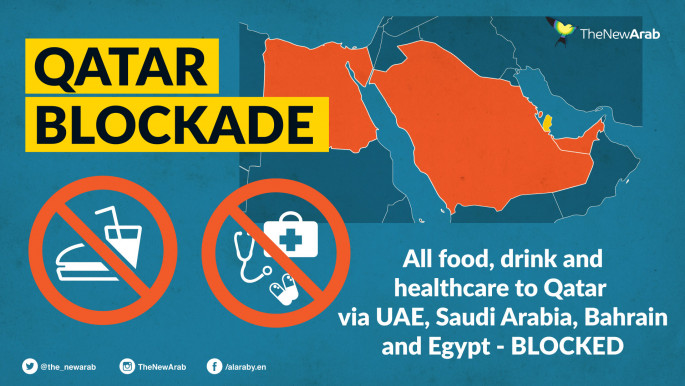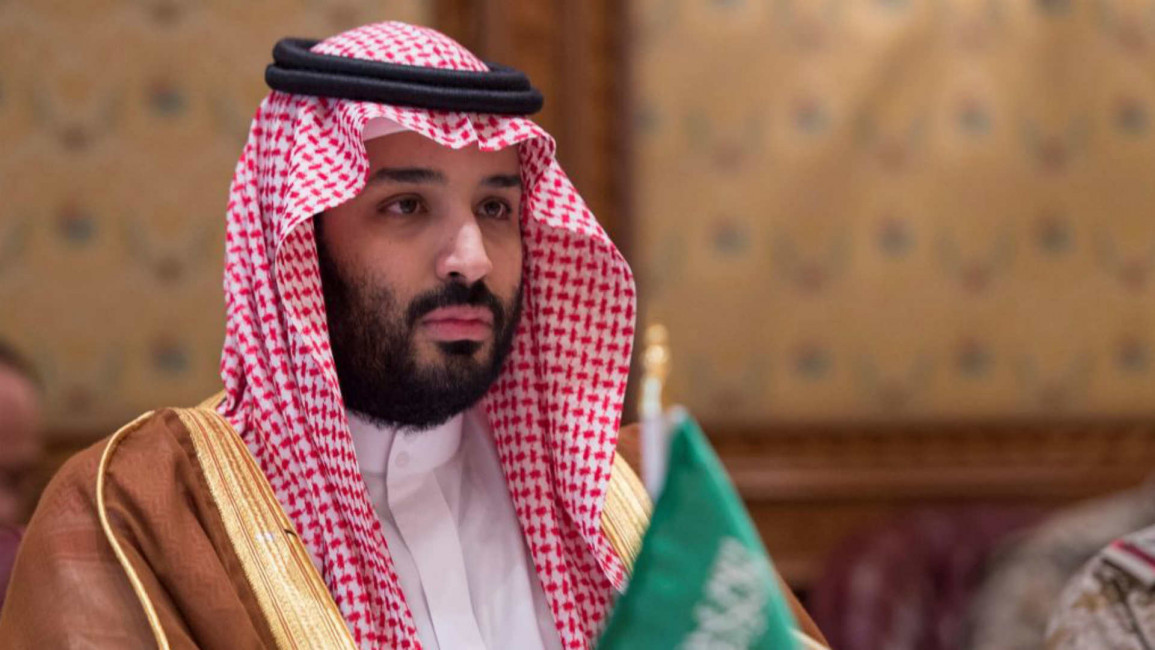
How does the Qatar crisis end?
Although the Qatar blockade is now in its fourth week, and showing no signs of coming to an end, a conclusion to this diplomatic crisis must inevitably emerge.
On 23 June the aggressors started the timer, with their 13 point ultimatum deadline set for 3 July. Now is a good moment to assess whether that timer is most likely attached to a reconciliatory injection, or a bomb destined to shatter Gulf relations.
Currently, the Saudi faction's combination of startlingly severe demands and headstrong intransigence towards compromise has rendered reconciliation an unlikely prospect.
The impasse is then compounded by the willingness of some - particularly Iran and Turkey - to support Qatar in the emirate's moment of need. This clash makes a settlement significantly difficult to envisage, although all-out war still thankfully remains a remote possibility.
Beginning, then, with the potential for rapprochement and a cessation of the blockade. When Saudi Arabia and its allies imposed a similar set of demands on Qatar in 2014, a deal was reached when Sheikh Tamim bin Hamad al Thani flew to Riyadh personally to agree and sign the Riyadh Agreement.
On this occasion, Saudi Arabia, the UAE and Bahrain's decision to cut all diplomatic ties was reversed, presumably by Qatari concessions (the full document was never released).
 |
The 13 points, to which the aggressors have demanded full adherence, range from the drastic to the ludicrous |  |
Surely a similar settlement could be reached this time? The fact that the Saudi faction have issued an ultimatum suggests that their priority is to gain concessions in order to renew relations, not permanently alienate or crush Qatar.
In reality, however, a reproduction of the Riyadh Agreement seems exceptionally unlikely. The 13 points, to which the aggressors have demanded full adherence, range from the drastic to the ludicrous.
Requiring Qatar to shut down the Arab world's largest and most successful media network - comparable in influence, scope and historic significance to the BBC - to evict Turkish military presence from the emirate (a de facto declaration of war), and to pay indeterminate reparations for the alleged loss of life and financial losses for historic Qatari foreign policy, is simply unconscionable.
 |
|
Uncompromising intransigence also recently manifested itself in last week's Saudi succession change. Mohammad bin Salman, overtly anti-Iran, and the architect of the blockade, was made heir apparent to the Saudi King, proving a tough position on Qatar is on the ascent in the kingdom.
The highly public nature of the showdown, and fact that Saudi Arabia and its allies believe Qatari commitment to the 2014 Riyadh Agreement to be insufficient, enforces their unrelenting stance on the ultimatum. Coupled with the refusal (and indeed impossibility) of Qatar to agree to this, reconciliation is hard to envisage.
An alternative scenario would be one in which a third-party mediating body helps broker a resolution, but seems that the time for this has now passed.
 |
There are grounds to make the serious case that Saudi Arabia and its allies have violated the norms and conventions of international law |  |
Both sides have become further entrenched in the time which has passed, and no concerted mediating force has materialised. French President Emmanuel Macron's initial vigour has ebbed away, whilst British Foreign Secretary Boris Johnson has remained reluctant to up the ante of the UK's involvement.
Johnson's official statement last week called for the Gulf States to water down their demands, and for Qatar to accept them. As illustrated above, neither of these are plausible.
This stance reflects the UK's caution in aggravating either party, crucial as they both are in the domestic fight against terrorism, and for economic links. This is to some degree understandable, but in absence of the compromise sometimes facilitated by mediation in times of diplomatic tension, rapprochement once again seems an inconceivable prospect.
| Read more: Anti-Qatar blockade is a consequence of its support for Arab Spring | |
In the words of UAE minister of state for foreign affairs, Dr Anwar Gargash, the alternative to agreeing to terms with its neighbours would be "parting ways". At least to an extent, this therefore stands as the most likely conclusion to the crisis.
The 3 July is likely to come and go, and the Saudi faction, assuming it carries out its threats, will not renew communicative channels, diplomatic relations, economic routes or movement channels with Qatar.
In response, the Doha will have no choice but to develop its latent replacement ties with other nations. Already Iran has been flying supplies into Doha, new shipping routes through Oman have bypassed the UAE and Turkey has upped its military presence at its Qatari base.
Some have questioned whether all aspects of Gulf trade and supply to Qatar can realistically be replaced comprehensively and swiftly, though the reality is, that this may ultimately be the only option. The emirate is both tiny and stupendously wealthy (boasting the globe's highest GDP/capita at $130,000), meaning it simultaneously has relatively few mouths to feed, and enormous means with which to do it.
 |
The irony of all this, of course, is that the Saudi faction's plan to scupper Doha-Tehran relations will in fact increase them |  |
Sixty-one percent of Qatar's GDP is non-oil or gas based - such as its huge overseas sovereign wealth fund - and such economic diversification adds weight to the feeling that its fortunes do not live and die by its Gulf relations.
The irony of all this, of course, is that the Saudi faction's plan to scupper Doha-Tehran relations will in fact increase them. Left with no choice, al-Thani will move closer to Saudi Arabia's perennial foe, who will surely be only too happy to welcome him with open arms.
Such developments risk further unsettling an already highly unstable Middle East, exacerbating the increasing polarisation between Iran and Saudi Arabia, which is embroiling all surrounding nations. A breakdown in relations between two crucial members of the coalition against terrorism carries grave consequences for the entire world.
Finally, it is worth mentioning that it is fortunately difficult to see the blockade escalating into warfare - at least at this stage.
 |
The ill-conceived actions of Saudi Arabia, the UAE, and Bahrain are likely to usher in a chain of events totally counterproductive to any goals they may have had in mind |  |
Outright war might appear a plausible development given that the blockade is a genuine casus belli against Qatar. It has threatened the authority of the ruling family, affected the livelihoods of Qatari citizens inside and outside the emirate, and damaged the economy.
There are also grounds to make the serious case that Riyadh and its allies have violated the norms and conventions of international law.
Military aggression, nonetheless, would be immensely costly for the entire Gulf region. There are Turkish military bases in Qatar, currently housing more than 3,000 troops. Would they defend the emirate's autonomy, given President Erdogan's vocal support of al-Thani? Would they be attacked? Turkish retaliation would surely ensue.
There also remains the issue of the 10,000 American troops stationed at Al-Ubeid airbase. President Trump might approve of the blockade, but picking sides in another war would be an entirely different matter, not to mention making a mockery of his "America First" policy.
Despite showing little sense thus far, even the Saudi faction must see how obviously out of bounds such actions are.
The myopic and ill-conceived actions of Saudi Arabia, the UAE, and Bahrain are therefore likely to usher in a chain of events totally counterproductive any goals they may have had in mind on 5 June.
Efforts to combat terrorism, bolster regional stability and strengthen Gulf relations are instead poised to give succour to extremist organisations and plunge the Middle East into further fragility. With a few days until the ultimatum's deadline, reconciliation is still on the table, but even the most ardent optimist would struggle to maintain hope for such an end now.
Marcus Solarz Hendriks currently works for the social enterprise Horizons and has written for various media outlets. He is currently playing full time tennis before studying the Middle East at Pembroke College, Cambridge in 2018.
Follow him on Twitter: @hendriks_marcus
Opinions expressed in this article remain those of the author and do not necessarily represent those of The New Arab, its editorial board or staff.
Join the conversation by tweeting to us: @the_newarab




